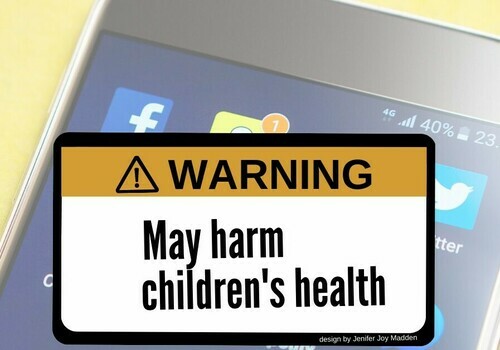
Putting warning labels on social media is among strategies to better protect child users being discussed by a U.S. Senate committee.
At the hearing “Protecting Our Children Online,” witnesses called by the Senate Committee on the Judiciary described a digital environment replete with social media harms. They also discussed ways for Congress to act.
Parent Nightmares Continue
Parent Kristin Bride described her horror at discovering her 16-year-old son had hung himself after he was viciously bullied online by anonymous social media users.
Bride is now a member of the bipartisan Council for Responsible Social Media. “I filed a National Class Action Lawsuit in May 2021 against Snap Inc. and [anonymous apps] Yolo and LMK.”
Snap subsequently banned the apps. However, a California court dismissed the complaint against Yolo and LMK, citing Section 230 of the Telecommunications Act of 1996.
Section 230 “generally provides immunity for website platforms with respect to third-party content,” according to Wikipedia.
Speaking for other parents, Bride testified, “Our numbers continue to grow exponentially with teen deaths from dangerous online challenges fed to them on TikTok, sextortion over Facebook, fentanyl-laced drugs purchased over Snapchat, and deaths from eating disorder content over Instagram.”
Changing the Social Media Business Model
Josh Golin, Executive Director of the child advocacy group Fairplay, described tech companies’ “insidious” business model.
“They use the reams of data they collect on young people and endless A/B testing to fine tune their platforms’ algorithms and design to maximize engagement, because more time and activity on a platform means more revenue.”
Golin contends that Congress can push the industry in another direction. “Apps, websites, and online platforms could be built in ways that reduce risks and increase safeguards for children and teens.”
Youth Mental Health Worsens
Mitch Prinstein, Chief Science Officer of the American Psychological Association, described the alarming state of teen mental health. The situation has prompted the U.S. Surgeon General to issue a special advisory.
“Depression rates for teens doubled between 2009 and 2019 and suicide is the second leading cause of death for U.S. youth, up 4% since 2020, with one in five teens considering suicide during the pandemic and eating disorder emergency room admissions for girls 12 to 17 years old doubling since 2019,” Prinstein testified.
A Centers for Disease Control and Prevention report released the week of the hearing shows youth mental health continues to decline. Days later, a report in JAMA Pediatrics reviewed screening tools for what have become known as Social Network Use Disorders (SNUD) in children and adolescents.
Prinstein said adolescence is “a developmentally vulnerable period during which youth may be especially motivated to pursue social rewards, and not yet fully capable of restraining themselves. Research suggests that technology and social media use may exploit this biological vulnerability among youth.”
Warning Labels Needed
Ranking Member Senator Lindsey Graham of South Carolina asked Prinstein, “Do you believe these products are unsafe the way they are configured today for children?”
“The research is emerging, but we have a number of reasons to think that some of the features that are built into social media indeed are conferring harm directly to children,” the psychologist replied.
“Are you recommending to the committee that these social media companies put warning labels on their products like we do with cigarettes?” the Senator asked.
From Prinstein: “I don’t think that would hurt at all.”
“Let’s Go Do It”
Senator Graham ticked through other ways Congress could act: by creating a regulatory consumer protection agency, changing Section 230 to allow for more consumer pushback, and passing bills the committee has previously approved—the Kids Online Safety Act and the EARN IT Act, which aims to prevent online sexual exploitation of children.
The Republican then directly addressed democratic Senator Dick Durbin:
“Mr. Chairman, we know what to do. Let’s go do it.”
Jenifer Joy Madden is a health journalist, certified digital wellness educator, and founder of DurableHuman.com.




[…] Action Sheet 10 has best practices for managing photos, videos, apps and online tools. Also covered: the risks of live video streaming and the problems associated with using social media to communicate with parents, which can be viewed as an endorsement of a chosen platform. Facebook and Instagram, for instance, are among those which have been shown to be harmful to young users’ mental health. […]
As a senior citizen born and raised in America ( of the baby boomer generation), I never dreamed of a future when I would be asked at times if I am human or robot, nor did I ever dream of witnessing a revolutionary rise in the new norm of programmed robotic behavior and its devastating consequences. While technology offers many conveniences, unfortunately it also offers and often forces its dark side on so many innocent unsuspecting minds. I am grateful that I was led to this site. May the Great Spirit continue to guide you, 🌹🐬🦋🐝
Thank you @Sajdah. Spirits like yours are who keep me going and having hope for humanity.💗